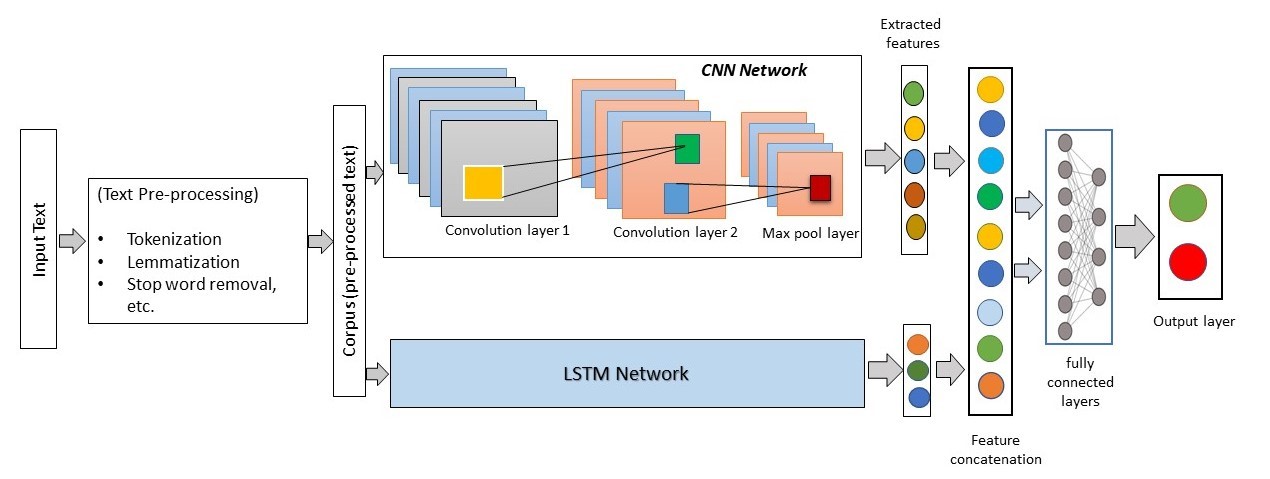A Hybrid Convolutional Network and Long Short-Term Memory (HBCNLS) model for Sentiment Analysis on Movie Reviews
Main Article Content
Abstract
This paper proposes a hybrid model (HBCNLS) for sentiment analysis that combines the strengths of multiple machine learning approaches. The model consists of a convolutional neural network (CNN) for feature extraction, a long short-term memory (LSTM) network for capturing sequential dependencies, and a fully connected layer for classification on movie review dataset. We evaluate the performance of the HBCNLS on the IMDb movie review dataset and compare it to other state-of-the-art models, including BERT. Our results show that the hybrid model outperforms the other models in terms of accuracy, precision, and recall, demonstrating the effectiveness of the hybrid approach. The research work also compares the performance of BERT, a pre-trained transformer model, with long short-term memory (LSTM) networks and convolutional neural networks (CNNs) for the task of sentiment analysis on a movie review dataset..
Article Details
References
Devlin, J., Chang, M. W., Lee, K., & Toutanova, K. (2018). BERT: Pretraining of deep bidirectional transformers for language understanding. arXiv preprint arXiv:1810.04805.
Lee, K., Dernoncourt, F., Seo, M., & Ro, Y. (2019). Latent variable dialogue models for goal-oriented systems. arXiv preprint arXiv:1902.08222.
Vaswani, A., Shazeer, N., Parmar, N., Uszkoreit, J., Jones, L., Gomez, A. N., & Polosukhin, I. (2017). Attention is all you need. In Advances in Neural Information Processing Systems, (5998–6008).
Zimbra, D., Abbasi, A., Zeng, D., & Chen, H. (2018). The state-of-the-art in Twitter sentiment analysis: A review and benchmark evaluation. ACM Transactions on Management Information Systems (TMIS), 9(2), 1-29.
Do, H. H., Prasad, P. W. C., Maag, A., & Alsadoon, A. (2019). Deep learning for aspect-based sentiment analysis: a comparative review. Expert systems with applications, 118, 272-299.
Chen, H., Wu, L., Chen, J., Lu, W., & Ding, J. (2022). A comparative study of automated legal text classification using random forests and deep learning. Information Processing & Management, 59(2), 102798.
Dang, N. C., Moreno-Garc´?a, M. N., & De la Prieta, F. (2020). Sentiment analysis based on deep learning: A comparative study. Electronics, 9(3), 483.
Patel, Y., Shah, J., & Pathar, S. (2022). Opinion Mining of Movie Reviews Using Hybrid Deep Learning Technique. In Computer Networks and Inventive Communication Technologies: Proceedings of Fifth ICCNCT 2022 (pp. 17-24). Singapore: Springer Nature Singapore.
Liu, Y., Ott, M., Goyal, N., Du, J., Joshi, M., Chen, D., Levy, O., Lewis, M., Zettlemoyer, L., & Stoyanov, V. (2019). RoBERTa: A Robustly Optimized BERT Pretraining Approach (Version 1). arXiv. https://doi.org/10.48550/ARXIV.1907.11692
Gupta, A., & Gupta, V. (2021). Unsupervised Contextualized Document Representation. In Proceedings of the Second Workshop on Simple and Efficient Natural Language Processing. Proceedings of the Second Workshop on Simple and Efficient Natural Language Processing. Association for Computational Linguistics. https://doi.org/10.18653/v1/2021.sustainlp-1.17
Zhang, Z., Zhang, Z., Chen, H., & Zhang, Z. (2019). A Joint Learning Framework With BERT for Spoken Language Understanding. In IEEE Access (Vol. 7, pp. 168849–168858). Institute of Electrical and Electronics Engineers (IEEE). https://doi.org/10.1109/access.2019.2954766
Dubey, G., Singh, H. P., Sheoran, K., Dhand, G., & Malik, P. (2022). Drug review sentimental analysis based on modular lexicon generation and a fusion of bidirectional threshold weighted mapping ¡scp¿CNN-RNN¡/scp¿. In Concurrency and Computation: Practice and Experience (Vol. 35, Issue 3). Wiley. https://doi.org/10.1002/cpe.7512
Qiu, J., Wang, B., & Zhou, C. (2020). Forecasting stock prices with long-short term memory neural network based on attention mechanism. PLOS ONE, 15(1), e0227222. https://doi.org/10.1371/journal.pone.0227222
Wang, Y., Guo, J., Yuan, C., & Li, B. (2022). Sentiment Analysis of Twitter Data. In Applied Sciences (Vol. 12, Issue 22, p. 11775). MDPI AG. https://doi.org/10.3390/app122211775
Zimbra, D., Abbasi, A., Zeng, D., & Chen, H. (2018). The State-of-the-Art in Twitter Sentiment Analysis. In ACM Transactions on Management Information Systems (Vol. 9, Issue 2, pp. 1–29). Association for Computing Machinery (ACM). https://doi.org/10.1145/3185045
Kamyab, M., Liu, G., & Adjeisah, M. (2021). Attention-Based CNN and Bi-LSTM Model Based on TF-IDF and GloVe Word Embedding for Sentiment Analysis. In Applied Sciences (Vol. 11, Issue 23, p. 11255). MDPI AG. https://doi.org/10.3390/app112311255
Patel, A., & Tiwari, A. K. (2019).Sentiment Analysis by using Recurrent Neural Network. In SSRN Electronic Journal. Elsevier BV. https://doi.org/10.2139/ssrn.3349572
Yoon, J., & Kim, H. (2017, November). Multi-channel lexicon integrated CNN-BiLSTM models for sentiment analysis. In Proceedings of the 29th conference on computational linguistics and speech processing (ROCLING 2017) (pp. 244-253).
Zhou, P., Qi, Z., Zheng, S., Xu, J., Bao, H., & Xu, B. (2016). Text classification improved by integrating bidirectional LSTM with two-dimensional max pooling. arXiv preprint arXiv:1611.06639.
Xu, G., Meng, Y., Qiu, X., Yu, Z., & Wu, X. (2019). Sentiment analysis of comment texts based on BiLSTM. Ieee Access, 7, 51522-51532.
Liu, Y., Ott, M., Goyal, N., Du, J., Joshi, M., Chen, D., Stoyanov, V. (2019). Roberta: A robustly optimized bert pretraining approach. arXiv preprint arXiv:1907.11692.
Xu, G., Meng, Y., Qiu, X., Yu, Z., Wu, X. (2019). Sentiment analysis of comment texts based on BiLSTM. Ieee Access, 7, 51522-51532.
Harsh Khatter, Anil K Ahlawat, “Web Blog Content Curation Using Fuzzy-Related Capsule Network-Based Auto Encoder”, International Journal of Pattern Recognition and Artificial Intelligence, Vol 36 (2), pp.1-30, 7 Jan 2022 (2022). https://doi.org/10.1142/S021800142250001X
H. Khatter, N. Goel, N. Gupta and M. Gulati, "Movie Recommendation System using Cosine Similarity with Sentiment Analysis," 2021 Third International Conference on Inventive Research in Computing Applications (ICIRCA), 2021, pp. 597-603, DOI: 10.1109/ICIRCA51532.2021.9544794
Harsh Khatter, Pooja Malik, Amrita Jyoti, Anil K Ahlawat, Anurag Mishra, Gaurav Dubey, Sanjeev Chandra “Adaptive and Personalized Web Blog Searching Technique Using S-ANFIS”, Journal of Sensors, Vol 2022, pp.1-9 (2022). 27 August 2022, https://doi.org/10.1155/2022/7242557

